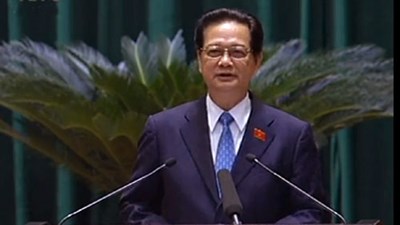PM unveils government performance priorities in 2014
It will accelerate institutional and administrative reforms, and further improve the investment environment, creating the prerequisite for sustainable development.
Prime Minister Nguyen Tan Dung made his commitment in a report presented at the ongoing National Assembly session in Hanoi on November 21.

Several days ago the National Assembly approved a Government proposal to increase 2014’s budget deficit to VND224 trillion (5.3% of GDP) and to issue an additional VND170 trillion worth of Government bond sales for 2014-2016.
Dung explained an increase in budget overspending is to pay debt, allocate additional funding to incomplete key socio-economic and ODA projects, and invest in the rural and agricultural sector.
He said higher overspending will help the government address inefficient public investments and capital construction debt, increase ODA disbursement, mobilise more social capital sources for development investment, ease business difficulties, and generate more jobs for people.
The government will keep a tight grip on the use of capital from the State budget and bond sales, alongside adopting an appropriate monetary policy and bringing credit growth under control, aiming to rein in inflation, ensure macro-economic stabilisation and stimulate growth.
Dung affirmed that with the approved overspending level, public debt will be within the safety limit in 2014-2016 (not more than 65% of GDP). However, he admitted the government is under considerable pressure for debt payment.
Economic restructuring
The government will pursue a medium-term investment plan, improve public investment efficiency, prevent scattered investment, and implement the Investment Law effectively, the PM said..
It will examine investment sources from the State budget, government bond sales, State businesses, ODA, development investment credits, and State-guaranteed loans, to focus on key projects, while accelerating economic restructuring and attracting more capital sources from society.
Dung said the government has issued a number of law-regulated documents, finalised institutions and increase State management of State-owned businesses. It has approved a master plan on restructuring economic groups and State corporations.
He noted despite difficult times in 2012-13, State businesses have weathered the storm to maintain production and guarantee State capital, helping stabilise the macroeconomy and obtain steady economic growth.
They made up 30% of the country’s budget revenue and more than 33% of GDP. More than 80% of the businesses reported profit and only 11.7% of them suffered a loss. Their equity increased 26% over 2011, and their return on equity (ROE) ratio was 16.37%, with economic groups and State corporations reporting a ROE ratio of 16.94%.
The government will try to overcome weaknesses and increase operational efficiency of State businesses, especially economic groups and corporations. It will accelerate the equitisation and divestment, reduce and/or sell all State capital in unimportant businesses, and increase business management capacity at economic groups and corporations.
It will ask State businesses to make public their annual operations in line with domestic law and international norms.
Dung assured the National Assembly the government will work harder to finalise the market economy institutions to create a healthy, transparent environment on an equal footing basis for businesses of all economic sectors to access resources and development opportunities.
He said Vietnam aims to consistently form and operate commodity, services, finance, labour, science-technology, and property markets, apply market prices to key commodities and services under the approved roadmap, along with supporting poor and low income earners.
The government will speed up administrative reform, especially in the areas of taxation, customs, business formation and dissolution, capital allocation, and land management, to support business and people’s operations.
Non-performing loans
According to the government leader, efforts to settle non-performing loans (NPL) of commercial banks have brought about initial results. More than VND101 trillion has been settled through banks’ provisions. The Vietnam Asset Management Company (VAMC) is expected to purchase VND30-35 trillion of NPLs from banks this year.
Dung said the NPL growth has slowed down and credit organisations’ liquidity has improved. The capital adequacy ratio has reached 13.7%, much higher than the required level of 9%.
However, the NPL ratio remains high, at 4.62% of the banking sector as of September 2013. It is difficult to address debt settlement due to the slow recovery of the property and stock markets. In addition, there are no effective mechanisms for heightening businesses’ responsibility towards tackling the debt.
The government will introduce consistent solutions for settling NPLs by establishing provisions, restructuring debts, improving credit quality, and increasing inspections to ensure transparent operation of credit organisations, Dung said.
VAMC is set to purchase VND100-150 trillion worth of NPLs from banks in 2014. Vietnam aims to resolve this thorny issue by 2015 to make the banking system operate healthily.
VOV

